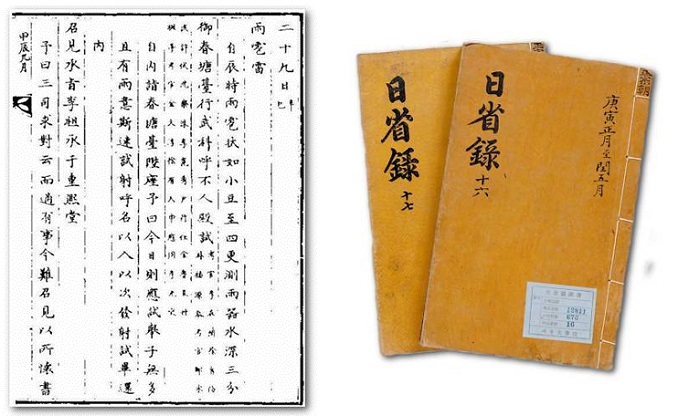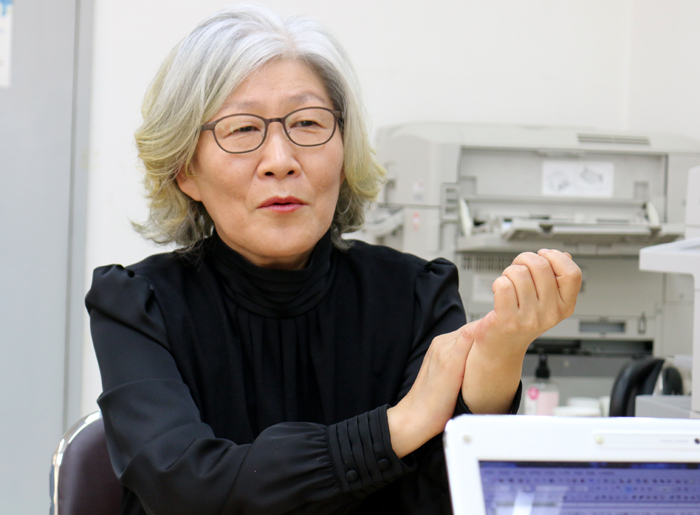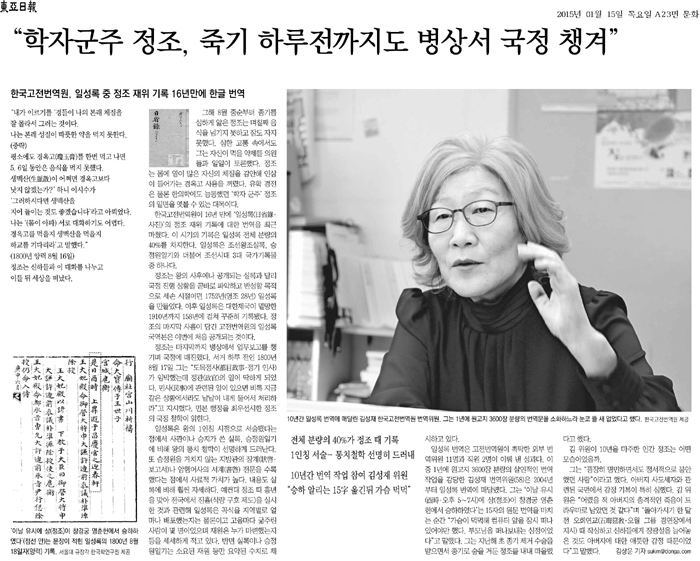-
 Korea.net's 24-hour YouTube channel
Korea.net's 24-hour YouTube channel- NEWS FOCUS
- ABOUT KOREA
- EVENTS
- RESOURCES
- GOVERNMENT
- ABOUT US
Out of the many records found in the "Ilseongnok" (日省錄), the daily records kept of the monarchy and the king’s acts at court which span from 1752 through to 1910, accounts of King Jeongjo (r. 1776-1800), the 22nd ruler of Joseon (1392-1910), have recently been translated from ancient Chinese into modern Korean.
The ancient "Ilseongnok" records are one of the three royal archives dating back to Joseon times, along with the "Annals of the Joseon Dynasty," the annual records kept for 472 years from the first king, Taejo (r. 1392-1398) through to the 25th king, Cheoljong (r. 1849-1863), and with the "Seungjeongwon Ilgi," a journal of the royal secretariat, called the Seungjeongwon.

In an effort to inspect and reflect upon royal affairs, King Jeongjo started having the "Ilseongnok" diary kept on a daily basis in 1752. After that, the records were kept for 158 years, until the fall of the Daehan Empire (1897-1910). King Jeongjo’s diary accounts for 40 percent of the entire records.
His narratives, which have now been translated into modern Korean from the ancient Chinese by the Institute for the Translation of Korean Classics, show his philosophy concerning the administration of state affairs and also recount the final four days of his life.
The records said that the king had a "boil," so serious that he could not swallow anything nor sleep for days since mid-August 1800. On August 17, just a day before his last breath, it was recorded that the king felt sorry that, “Even though a regular shake-up of officials (都目政事) is just around the corner, things are not working out well in the office these days.”
“Under these circumstances, you must report in detail to me everything concerning civil affairs, no matter what,” the king ordered.
As predicted in the accounts, despite agonizing pain from his infliction, the king had his officials keep him posted on their work.
The Dongah Ilbo, a Seoul daily, hypothesized in a January 15 article that, “Nothing could more clarify the king’s governance philosophy than the 'Ilseongnok' diary, in that the stories in here are told by the king himself in the first person.”
The newspaper also said that, “The narratives are much more detailed and much higher in historical value than any other document.”
Conforming to the newspaper's analysis, the records show in detail, for example, how a food relief program, known as the jinhyul, which the king came up with after a bad harvest, was carried out nationwide, and how much produce was distributed to the public, and how many people from each county were starving, and even who secured financing for the program.

Behind the arduous translation of the king’s diary was Kim Seong-jae of the Institute for the Translation of Korean Classics. It took her as many as ten years to finish the job, a task wherein Kim had to translate more than 3,600 manuscripts per year.
In a recent interview with the Dongah Ilbo, Kim said, “The moment I was done with the translation of the final 15 characters, ‘On August 16, 1800, between 5 p.m. and 7 p.m., King Jeongjo passed away in the Yeongchunheon Hall of Changgyeonggung Palace,’ I got choked up and had to stay away from the computer for a while, a computer at which I had sat for the past ten years or so. It felt like I had to let my parents go.”
Kim remarked on the humane aspects of the king's rule, saying that, “I can tell that the king was astonishingly intelligent and, at the same time, unstable emotionally.”
“Anything concerning his ill-fated father, Crown Prince Sado (1735-1762), would upset him. It seems that the shocking, sudden execution of his father left him with deep scars, like a trauma,” she added.

The modern Korean translation of the king’s "Ilseongnok" diary can be found online at the link below.
http://db.itkc.or.kr/index.jsp?bizName=MI
By Sohn JiAe
Korea.net Staff Writer
Photos: the Institute for the Translation of Korean Classics
jiae5853@korea.kr
The ancient "Ilseongnok" records are one of the three royal archives dating back to Joseon times, along with the "Annals of the Joseon Dynasty," the annual records kept for 472 years from the first king, Taejo (r. 1392-1398) through to the 25th king, Cheoljong (r. 1849-1863), and with the "Seungjeongwon Ilgi," a journal of the royal secretariat, called the Seungjeongwon.

The "Ilseongnok" records describe the way in which King Jeongjo governed his country during his reign from 1776 to 1800.
In an effort to inspect and reflect upon royal affairs, King Jeongjo started having the "Ilseongnok" diary kept on a daily basis in 1752. After that, the records were kept for 158 years, until the fall of the Daehan Empire (1897-1910). King Jeongjo’s diary accounts for 40 percent of the entire records.
His narratives, which have now been translated into modern Korean from the ancient Chinese by the Institute for the Translation of Korean Classics, show his philosophy concerning the administration of state affairs and also recount the final four days of his life.
The records said that the king had a "boil," so serious that he could not swallow anything nor sleep for days since mid-August 1800. On August 17, just a day before his last breath, it was recorded that the king felt sorry that, “Even though a regular shake-up of officials (都目政事) is just around the corner, things are not working out well in the office these days.”
“Under these circumstances, you must report in detail to me everything concerning civil affairs, no matter what,” the king ordered.
As predicted in the accounts, despite agonizing pain from his infliction, the king had his officials keep him posted on their work.
The Dongah Ilbo, a Seoul daily, hypothesized in a January 15 article that, “Nothing could more clarify the king’s governance philosophy than the 'Ilseongnok' diary, in that the stories in here are told by the king himself in the first person.”
The newspaper also said that, “The narratives are much more detailed and much higher in historical value than any other document.”
Conforming to the newspaper's analysis, the records show in detail, for example, how a food relief program, known as the jinhyul, which the king came up with after a bad harvest, was carried out nationwide, and how much produce was distributed to the public, and how many people from each county were starving, and even who secured financing for the program.

Kim Seong-jae from the Institute for the Translation of Korean Classics worked on the translation of King Jeongjo’s 'Ilseongnok' diary for about ten years, starting in 2004.
Behind the arduous translation of the king’s diary was Kim Seong-jae of the Institute for the Translation of Korean Classics. It took her as many as ten years to finish the job, a task wherein Kim had to translate more than 3,600 manuscripts per year.
In a recent interview with the Dongah Ilbo, Kim said, “The moment I was done with the translation of the final 15 characters, ‘On August 16, 1800, between 5 p.m. and 7 p.m., King Jeongjo passed away in the Yeongchunheon Hall of Changgyeonggung Palace,’ I got choked up and had to stay away from the computer for a while, a computer at which I had sat for the past ten years or so. It felt like I had to let my parents go.”
Kim remarked on the humane aspects of the king's rule, saying that, “I can tell that the king was astonishingly intelligent and, at the same time, unstable emotionally.”
“Anything concerning his ill-fated father, Crown Prince Sado (1735-1762), would upset him. It seems that the shocking, sudden execution of his father left him with deep scars, like a trauma,” she added.

The Dongah Ilbo reports on the recent translation of the Joseon-era 'Ilseongnok' royal records on January 15.
The modern Korean translation of the king’s "Ilseongnok" diary can be found online at the link below.
http://db.itkc.or.kr/index.jsp?bizName=MI
By Sohn JiAe
Korea.net Staff Writer
Photos: the Institute for the Translation of Korean Classics
jiae5853@korea.kr
Most popular
- First hearing-impaired K-pop act hopes for 'barrier-free world'
- Expats could account for 7% of population in 20 years: report
- 'Mad Max' director impressed by 'cinema-literate' Korean viewers
- Show in Italy to present 'thought-filled' Korean craftworks
- Romanian presidential couple visits national cemetery













